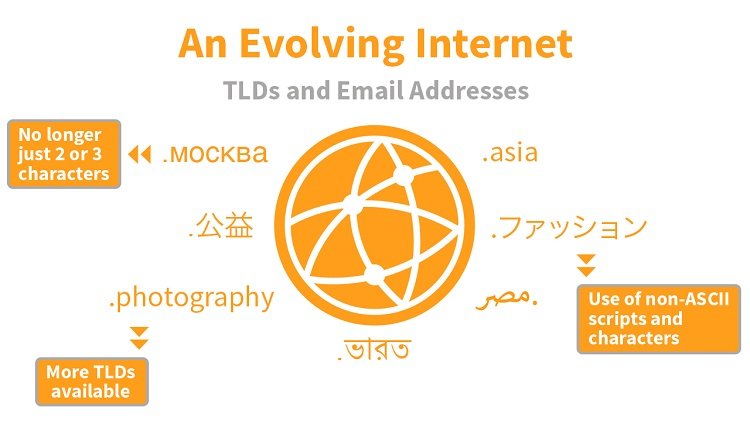By
Prince Andrew Livingstone Zutah
A Global Call On IT Leaders, Companies, Governments, Telecommunications, Tech Developers & Programmers, Application Owners, Academia, Public & Private Actors, Etc, to Adapt Universal Acceptance Standards.
Universal Acceptance
Universal Acceptance (UA) is an idea that guarantees the equal treatment of all domain names and email addresses along with their utilization by all Internet-enabled systems, devices and applications. The domain names include New generic Top-Level Domains (gTLDs) and Internationalized Domain Names (IDNs). UA requires process, acceptance, validation, storage and display of these domain names and email addresses at equal and consistent level. It is a rudimentary feature of advocating Internet diversity and multilingualism. Without the attainment of UA, it is impossible to impart reliable and constructive professionalism to all the Internet traffic.

UA Exigency due to the Internet Evolution
In the 1960s, the Internet started as a source of research and communication in the government organizations. This development originated the Advanced Research Projects Agency Network (ARPANET). The APRANET ultimately led to the creation of the Internet on a wide scale. The official rise of the Internet began on January 01, 1983. Since then, a myriad of steps has been adopted to meet the needs and requirements of the Internet users. In this process, the proliferation of the Domain Name System (DNS) has paved a way to stimulate competition, innovation and user-friendly choices. It has become possible due to the injection of New gTLDs and IDNs into the Internet ecosystem with the help of the New gTLD Program. Email Address Internationalization (EAI) is another protocol that enables email addresses based on the incorporation of IDNs to operate accurately inside the application. Moreover, UA has bridged the gap of linguistic impediments that are faced by the users all around the globe. Now, the Internet consumers have a wide range of choices and possibilities in choosing their identities based on the local languages that fall under the category of non-American Standard Code for Information Interchange (non-ASCII) characters. This in turn helps government institutions, private organizations and civil associations in uplifting their businesses and promoting entrepreneurship. Therefore, UA has become the need of the hour to comply with the Internet Corporation for Assigned Names and Numbers (ICANN) standards.
Objectives of UA
The goal of UA is to have the same level of compliance for every domain name and email address. For instance,
The domain name universal-acceptance.example should have the same level of acceptance as that of universal-acceptance.com. Similarly, the email address universal_acceptance@example.com should have the same rate of compliance as that of universal_acceptance@example.technology.
In addition, there occurs a number of circumstances, such as, online transactions that fail mainly due to the inclusion of domain names with more than 3 characters or different languages. In such situations, UA provides a gateway to overcome the barriers.
Advantages of UA
Greater Accessibility: With the rapid expansion of the domain name space, UA ensures a wide range of accessibility for all of its consumers and amplifies the client network. It also enables the consumers to enlarge the customer base.
Improvement in the User Experience: UA-ready applications, services and websites help in improving the user experience. For instance, a UA-ready website will enable the consumers to utilize the site and its services with new IDNs and TLDs. Similarly, a UA-ready organization will allow the users to make use of the email addresses in any script.
Proliferation of Businesses: UA-ready businesses and associations provide a better path for the success and prosperity of a business. Identities based on the consumers’ choices help them in realizing their dreams. Therefore, in order to pace up with the ever-increasing domain name space, the functioning of the businesses and organizations should be UA-ready.
Promotion of Standards: UA helps in espousing standards and practices that are inevitable for the confidence-building measures among the consumers. In the long run, it proves beneficial in promoting client-contractor relationship.
Global Competition Advocacy: UA is a prerequisite for progress and competition in order to ensure multilinguistic content all around the world. With the expansion of the IDNs, it has become indispensable to introduce UA as a building block of the worldwide competition.
Role of the ICANN in UA
The ICANN is a proactive advocate for UA. It has been continuously transforming its systems to become UA-ready. In this regard, it has introduced a number of committees and groups to make sure that the associations and organizations are complying with the standard UA guidelines. It espouses the role of UA as a key factor for the next billion Internet users. In addition to advocating competition and consumer choice, it has completed the process of registration for a number of domain names and established affiliated email addresses for utilization by any person desiring to test UA-readiness of the services.
Universal Acceptance Steering Group
Financially and administratively advocated by the ICANN, the Universal Acceptance Steering Group (UASG) is a franchise of industry heads that has been vocal in promoting UA since 2015. Officials from more than 120 organizations, communities and governments are currently serving in the UASG. It has made substantial efforts over the past few years in order to educate the masses regarding UA all around the globe. Its contribution in endorsing UA-readiness can be observed on the website (link) along with a multitude of educational guidelines related to UA.
A Wake-up Call
Based on the aforementioned research, awareness is the key hindrance in the way of UA instead of the implementation cost. Therefore, it is an unavoidable fact that the Information Technology (IT) leadership, web developers and software houses must comply with the UA standards. Their intentions and willingness play a pivotal role in rectifying and upgrading software and websites UA-ready. The prospects of development depend on the nature of the association. For instance, execution of UA for large companies like Microsoft, Google or Twitter is a cakewalk because of the team efforts. Small firms use third-party software to develop their websites which renders them possible to make the company UA-ready. In addition to government agencies, mid-sized organizations face a slew of issues in complying with the UA guidelines due to their less-focused policies for the individuals.
Conclusion
In view of the above-mentioned research, it is concluded that the advantages of implementing UA surpass the costs for the IT leaders, web developers and application owners. Lack of awareness is the only stumbling block in the way. It can be implemented effectively by taking into account the positive impacts. A variety of new domains attracts a pool of new users which, in turn, will increase the registration process. Hence, in order to experience social, cultural and economic boons of the Internet, implementation of UA is inexorable so that the ICANN’s goal of “One World, One Internet” could be achieved.
References
[1] ICANN’s Official Website: www.icann.org
[2] USAG’s Official Website: www.usag.tech
[3] Global Internet Users’ Data (2021): www.internetlivestats.com/internet-users/
[4] World Population (2021): www.worldometers.info/world-population/
Author

Prince Andrew Livingstone Zutah is the Founder/ CEO of Palz Technologies. He is a Software Engineer, Cybersecurity Expert , Developer, Youth Advocate & Activist, E-Governance & Internet Governance advocate. He is a member of the Internet Society, The Institute Of IT Professionals Ghana (IIPGH), Ghana School On Internet Governance (GhanaSIG) Fellow, Blacks In Cybersecurity, E-Governance and Internet Governance Foundation for Africa (EGIGFA), LXG Ghana, National Computer Academy -USA, IT Specialist Network, Etc.
He also belongs to several working groups at The Internet Corporation for Assigned Names and Numbers (ICANN) and currently a member of Universal Acceptance Email Address Internationalization Working Group in ICANN.
We create powerful, insightful content that fuels the minds of entrepreneurs and business owners, inspiring them to innovate, grow, and succeed.